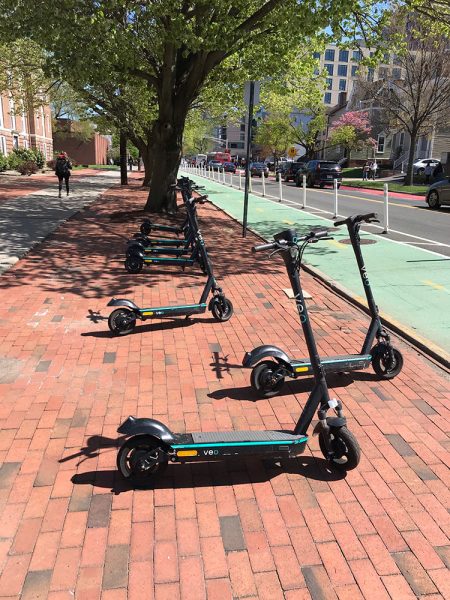- 848.932.7474
- info@rutgersalumni.org
By Jeannine DeFoe RC’97
Students on the New Brunswick campus can now enjoy an alternative to walking to class or squeezing onto crowded buses as a way to get around, thanks to 300 electric scooters now available to rent for short rides.
The “e-scooters” arrived through a partnership with Veo, a “micro-mobility” company based out of Chicago. The company’s Astro e-scooters arrived in the fall of 2020 and are gaining in popularity especially when warmer weather arrives.
Students access the scooters through an app on a mobile phone. Veo doesn’t charge a membership fee, though each ride costs $1 to unlock the scooter, then a rate of 37 cents a minute. In addition, Veo offers discounted pricing for lower-income riders that includes 30 minutes of free riding per day. Each scooter is powered by a rechargeable battery and features 10.5-inch tires and front and rear suspension. The scooters aren’t found in a set area: students locate an available scooter near them through the app, and at the end of the ride must leave the scooter in a safe location.

Rutgers added the e-scooters to help achieve a more balanced transportation network with more travel choices, according to John Karakoglou, assistant director of transportation services in Rutgers University Institutional Planning and Operations.
“Students seem to enjoy the scooters as a fun way to get around the campus,” said Karakoglou. “I’m looking forward to seeing how much students use them as they return to campus as the university resumed in-person classes.”
Veo started by offering scooters on the Purdue University campus in 2017 and has since expanded to large cities, including New York, Los Angeles and Santa Monica. Still, the steady ridership rates of college campuses and their surrounding neighborhoods are a fit with the scooter program, said Alex Keating, director of policy and partnerships for Veo. He points to similar scooter programs at other large universities as well, including the University of Alabama, University of Maryland, Indiana, and Texas A&M.
“All universities benefit from these first mile/last mile transportation programs,” said Keating. “All these universities have quite similar travel profiles, with students making similar types of trips. So the scooters can really complement the university bus systems and fill gaps where those buses don’t run.”
Over the life of the program, students have taken 300,000 rides, Keating said, with an average distance covered of just less than 2 miles. “We see that distance as the sweet spot,” he said, noting that distance may be too long to walk but too short to consider driving or even using a car service like Uber. “These scooters fill a transportation need.”
Keating said that students on the Rutgers Newark campus could access Veo scooters through an agreement the company has to provide scooters to the whole city.
The scooters’ arrival has not come without some criticism. For example, a Daily Targum editorial published in September 2021 criticized the scooters as creating a safety hazard to pedestrians and drivers and blocking sidewalks and paths due to riders ending rides and then parking them incorrectly.
Veo’s Keating counters that Veo encourages safe ridership with measures including all users taking training through the app and snapping a picture of where they park the scooter when their ride is over to show they left the scooter in a safe location. In addition, Veo penalizes and even bans riders for irresponsibly ending rides.